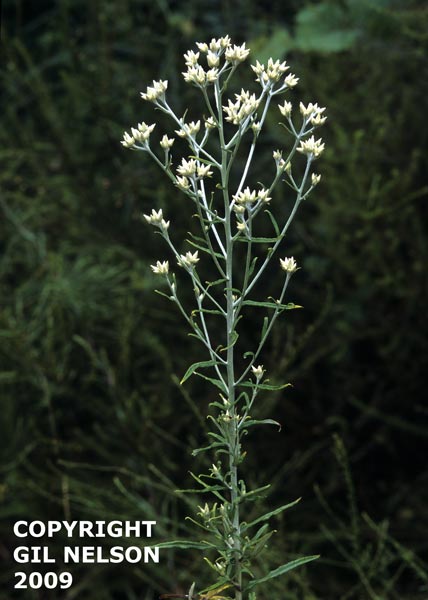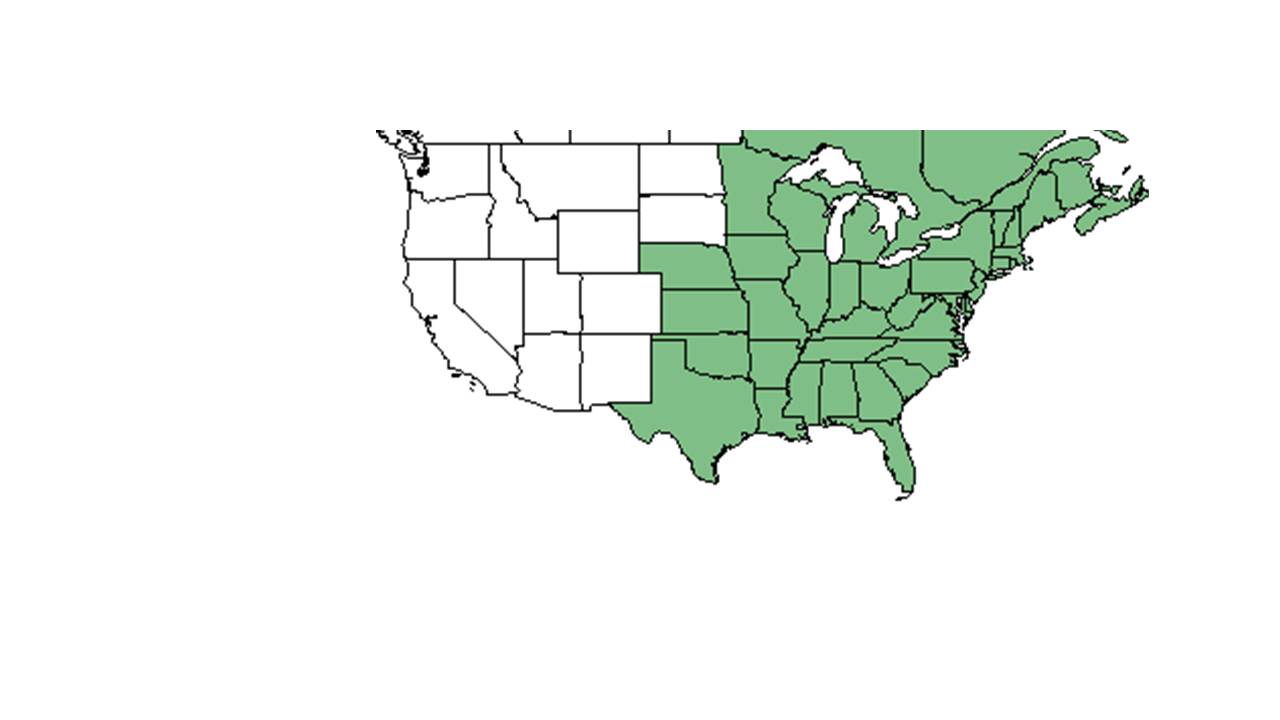Difference between revisions of "Pseudognaphalium obtusifolium"
(→Pollination) |
|||
| Line 40: | Line 40: | ||
===Fire ecology=== <!--Fire tolerance, fire dependence, adaptive fire responses--> | ===Fire ecology=== <!--Fire tolerance, fire dependence, adaptive fire responses--> | ||
===Pollination=== | ===Pollination=== | ||
| − | The following Hymenoptera families and species were observed visiting flowers of ''Pseudognaphalium obtusifolium'' at Archbold Biological Station | + | The following Hymenoptera families and species were observed visiting flowers of ''Pseudognaphalium obtusifolium'' at Archbold Biological Station. <ref name=dey> Deyrup, M.A. and N.D. 2015. Database of observations of Hymenoptera visitations to flowers of plants on Archbold Biological Station, Florida, USA.</ref> |
Sphecidae: ''Cerceris blakei'' | Sphecidae: ''Cerceris blakei'' | ||
Revision as of 12:04, 14 April 2016
| Pseudognaphalium obtusifolium | |
|---|---|

| |
| Photo taken by Gil Nelson | |
| Scientific classification | |
| Kingdom: | Plantae |
| Division: | Magnoliophyta – Flowering plants |
| Class: | Magnoliopsida – Dicotyledons |
| Order: | Asterales |
| Family: | Asteraceae ⁄ Compositae |
| Genus: | Pseudognaphalium |
| Species: | P. obtusifolium |
| Binomial name | |
| Pseudognaphalium obtusifolium (L.) Hilliard & B.L. Burtt | |

| |
| Natural range of Pseudognaphalium obtusifolium from USDA NRCS Plants Database. | |
Common names: Rabbit Tobacco or Sweet Everlasting (Nelson 2005).
Contents
Taxonomic notes
Description
A description of Pseudognaphalium obtusifolium is provided in The Flora of North America.
Distribution
It is found in medium-sized gaps in a study investigating the interacting effects of overstory removal and ungulate herbivory in a hemlock hardwood forest in Alberta, Michigan (Holmes and Webster 2011).
Ecology
Habitat
In the Coastal Plain in Florida and Georgia, P. obtusifolium can be found in mesic hardwoods, turkey oak scrubs, longleaf pine/scrub oak stands, pine flatwoods, bordering cattail marshes, sand ridges, cypress pond margins, annually burned pine savannas, and annually burned mature longleaf pine-wiregrass communities [1] Nelson 2005). It can also be found in roadside ditches, and open fields. Soil types include loamy sand, peat soils, sandy loam, and clay soil. [1] Associated species include slash pine, loblolly bay, longleaf pine, wiregrass, Liatris, Panicum, Leptoloma cognata, Polygonella, and Amphicarpum. [1] It has been observed that five to eight years after thinning a longleaf pine stand there was an increase in the frequency of P. obtusifolium (Harrington et al. 2011).
Phenology
It flowers August through October. [1]
Seed dispersal
According to Kay Kirkman, a plant ecologist, this species disperses by wind. [2]
Seed bank and germination
Fire ecology
Pollination
The following Hymenoptera families and species were observed visiting flowers of Pseudognaphalium obtusifolium at Archbold Biological Station. [3]
Sphecidae: Cerceris blakei
Use by animals
Diseases and parasites
Conservation and Management
Cultivation and restoration
Photo Gallery
References and notes
Deyrup, M.A. and N.D. 2015. Database of observations of Hymenoptera visitations to flowers of plants on Archbold Biological Station, Florida, USA.
Florida State University Robert K. Godfrey Herbarium database. URL: http://herbarium.bio.fsu.edu. Last accessed: July 2015. Collectors: Loran C. Anderson, David Hall, Gary Schultz, Cecil R Slaughter, A. F. Clewell, R.K. Godfrey, R. E. Perdue, Jr., Rev. Robert Brinker, James P. Gillespie, C. Jackson, Paul L. Redfearn, Jr., Richard S. Mitchell, Gary R. Knight, H. E. Grelen, H. Larry Stripling, D. B. Ward, E. S. Ford, R. Komarek, William D. Reese, Dianne Hall, MacClendons, G. Wilder. States and Counties: Florida: Bay, Calhoun, Citrus, Clay, Dixie, Escambia, Franklin, Gadsden, Gulf, Hamilton, Jackson, Lafayette, Leon, Liberty, Nassau, Putnam, Volusia, Wakulla. Georgia: Grady, Thomas. Compiled by Tall Timbers Research Station and Land Conservancy.
Harrington, T. B. 2011. Overstory and understory relationships in longleaf pine plantations 14 years after thinning and woody control. Canadian Journal of Forest Research 41: 2301-2314.
Holmes, S. A. and C. R. Webster 2011. Herbivore-induced expansion of generalist species as a driver of homogenization in post-disturbance plant communities. Plant Ecology 212: 753-768.
Nelson, Gil. East Gulf Coastal Plain Wildflowers. A Field Guide to the Wildflowers of the East Gulf Coastal Plain, including Southwest Georgia, Northwest Florida, Southern Alabama, Southern Mississippi, and Parts of Southeastern Louisiana. Guilford, CT: Falcon, 2005. 115. Print.
- ↑ 1.0 1.1 1.2 1.3 Florida State University Robert K. Godfrey Herbarium database. URL: http://herbarium.bio.fsu.edu. Last accessed: July 2015. Collectors: Loran C. Anderson, David Hall, Gary Schultz, Cecil R Slaughter, A. F. Clewell, R.K. Godfrey, R. E. Perdue, Jr., Rev. Robert Brinker, James P. Gillespie, C. Jackson, Paul L. Redfearn, Jr., Richard S. Mitchell, Gary R. Knight, H. E. Grelen, H. Larry Stripling, D. B. Ward, E. S. Ford, R. Komarek, William D. Reese, Dianne Hall, MacClendons, G. Wilder. States and Counties: Florida: Bay, Calhoun, Citrus, Clay, Dixie, Escambia, Franklin, Gadsden, Gulf, Hamilton, Jackson, Lafayette, Leon, Liberty, Nassau, Putnam, Volusia, Wakulla. Georgia: Grady, Thomas. Compiled by Tall Timbers Research Station and Land Conservancy.
- ↑ Kay Kirkman, unpublished data, 2015.
- ↑ Deyrup, M.A. and N.D. 2015. Database of observations of Hymenoptera visitations to flowers of plants on Archbold Biological Station, Florida, USA.